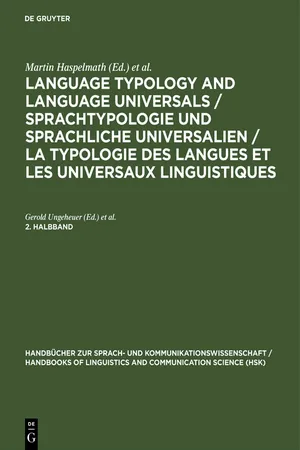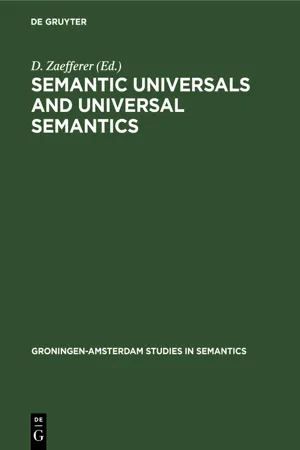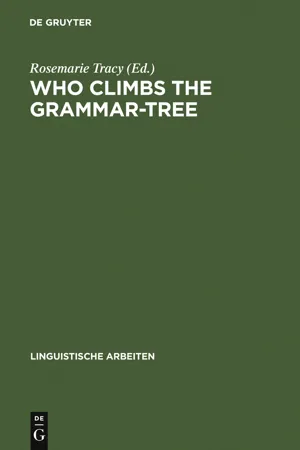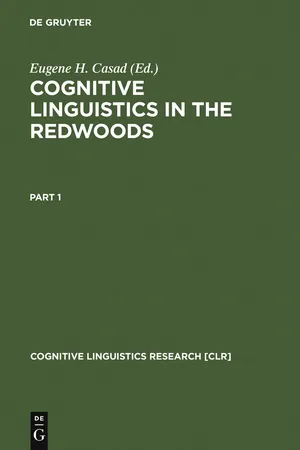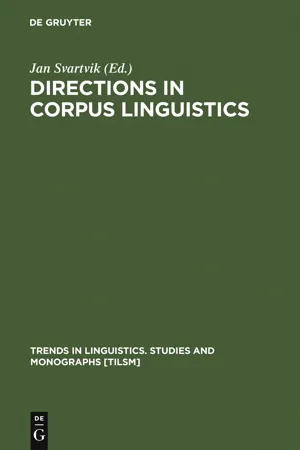Languages & Linguistics
Conditional Sentences
Conditional sentences are grammatical structures that express a hypothetical situation and its potential outcome. They consist of an "if" clause (the condition) and a main clause (the result). There are different types of conditional sentences, including zero, first, second, and third conditionals, each with its own specific usage and structure. These sentences are commonly used in everyday language to discuss possibilities, hypothetical situations, and consequences.
Written by Perlego with AI-assistance
Related key terms
1 of 5
6 Key excerpts on "Conditional Sentences"
- Martin Haspelmath, Ekkehard König, Wulf Oesterreicher, Wolfgang Raible, Martin Haspelmath, Ekkehard König, Wulf Oesterreicher, Wolfgang Raible(Authors)
- 2008(Publication Date)
- De Gruyter Mouton(Publisher)
998 X. Syntactic Typology 76. Conditional constructions 1. Introduction 2. Conditionals in logic and linguistics 3. Conditional markers 4. Tense, aspect, mood, modality and polarity in conditionals 5. Conditionals are topics 6. Conditionals, concessive conditionals and concessives 7. Special abbreviations 8. References 1. Introduction Conditionals are a subclass of sentences that contain adverbial clauses of circumstance. The inventory of circumstantial relations that may be expressed by complex sentences with adverbial clauses traditionally includes con-ditional relations, in addition to causal, temporal, concessive, concessive conditional, comparative, purposive and resultative ones. A prototypical conditional sentence, like (1) (1) If the weather is fine we shall go for a walk. consists of two clauses, one of which (if the weather is fine), usually called protasis, ante-cedent or, simply, «/-clause, expresses a prop-osition whose fulfillment or non-fulfillment is relevant to the degree of reality assigned to the proposition expressed by another clause (we shall go for a walk), usually called apodo-sis or consequent (Trask 1993: 55). There are not many systematic cross-linguistic studies of conditionals. Among the few are Traugott et al. 1986, Athanasiadou & Dirven 1997, Xrakovskij 1998. Our overview of the structure of condi-tionals across languages will be organized as follows: In §2., we shall briefly discuss how the conditional relation in natural languages differs from material implication as defined in logic. § 3. examines formal types of condi-tionals. In §4., we will look at grammatical marking of protasis and apodosis. In § 5., discourse functions of conditionals are dis-cussed. Finally, in § 6., we show how condi-tionals are related to concessive conditionals and concessives.- eBook - PDF
- D. Zaefferer(Author)
- 2019(Publication Date)
- De Gruyter Mouton(Publisher)
Conditionals and Unconditionals: Cross-linguistic and Logical Aspects Dietmar Zaefferer Institutfür Deutsche Philologie Universität München Schellingstr. 3 D-8000 München 40 Although Conditional Sentences are important in all languages, and although their logic' has been thoroughly, if inconclusively, investigated by philosophers, our knowledge and understanding of them in the languages of the world is very poor. (Palmer 1986: 188) 0. Introduction The main purpose of this paper is to argue against the sceptic tenor of its anti-motto, the quotation of Palmer's, and for the continuation of a love story called 'typology meets formal semantics' that has started its delicate course some time ago at the 1983 Stanford symposium on conditionals, and that still needs a lot of encouragement in order to blossom. I think that it deserves this encouragement because it promises substantial progress both for the research in typology and linguistic universals and for formal semantics and language-oriented logics. I will try to argue for this using the example of conditional forms and functions and their relatives on the one hand, and a theory of conditionals inspired by ideas of Barwise, Gardenfors, Heim, Kratzer, Lewis and Rott 1 on the other. Whereas this paper emphasizes the typological data and presents the theory only in rough outline, a (partially overlapping) companion paper to the present one (Zaefferer 1990) spells out the theory in more detail after only a short summary of the typological findings. To get started, some terminological clarifications will be proposed and some methodological principles will be stated. 0.1. Terminological clarifications First: What do I understand by a conditional? A conditional or more explicitly a conditional form is a grammatical structure or construction that encodes a conditional function as its primary purpose. - eBook - PDF
Who Climbs the Grammar-Tree
[leaves for David Reibel]
- Rosemarie Tracy(Author)
- 2011(Publication Date)
- De Gruyter(Publisher)
But from a broader perspective, such as is given by Situational Grammar, it appears that verb forms are determined by the kind of situation they designate, and that this in turn is a function of the text-world in force for the particular (stage of the) discourse. What we might call a 'Conditional situation 1 stems from a text-world which is designated so as to be distinct from the current immediate situation or any of the historical situations leading up to it. This is a common text-world type for all hypothetical, imaginary, fictitious or fantastic situations, but what distinguishes a conditional situation from the more narrative types of imaginary world is the fact that a science-fiction story or a fairy tale, for instance, will normally remain 'inside 1 its world and can therefore use ordinary narrative tenses etc. The conditional situa-tion, on the other hand, has almost always a parallel relationship with the 'actual 1 world, and is constantly in comparison with it. We have so far distinguished two kinds of uses for the form would: an independent use, in which it is in some sense the Past or Remote form of will (e.g. (30) and (31) above); and a dependent use, either the Conditional construction (e.g. (32), (33) and (35)) or Reported speech (e.g. (34) above). In both of the dependent types, there is a sequence of tenses rule in English, though with several permissible variations. I shall start with the dependent Condi-tional construction. As set out above, the Conditional partakes of a hypothetical text-world which is in constant comparison with the world around it (itself a text-world like any other). This is actually effected as follows: the i/-clause delineate the hypothetical world, which is, in textual terms, embedded in the text-world already delineated for the containing discourse. - eBook - PDF
Cognitive Linguistics in the Redwoods
The Expansion of a New Paradigm in Linguistics
- Eugene H. Casad(Author)
- 2011(Publication Date)
- De Gruyter Mouton(Publisher)
The class of conditional speech acts is investigated by Wunderlich (1977) as warnings and threats, pieces of advice, extortions and nego-tiations, offers and proposals, and the role of speech acts that use counterfactuals. 610 Angeliki Athanasiadou and René Dirven The main object of Sweetser's analysis is to elucidate the function-ing of conditionality in the content domain (real world), in the epis-temic domain (knowledge of the truth of the hypothetical premise ex-pressed in the protasis would be a sufficient condition for concluding the truth of the proposition expressed in the apodosis) and in the speech-act domain (the performance of the speech act represented in the apodosis is conditional on the fulfillment of the state described in the protasis). All these above analyses, however insightful and detailed they are, do not consider the full spectrum of «/-clauses in English. In fact, they mostly concentrate on one or two types of «/-clauses, namely what we can already call now hypothetical and logical ¿/-clauses. In contrast to this, the aim of the present paper is to provide a detailed description of all the types of English i/-clauses. We also want to study the relation-ships and connections between these types and subtypes in order to make an initial contribution to the discussion of more fundamental questions such as the following: which are the central uses of «/-clauses, how do these cover major cognitive and communicative needs, and how have more marginal uses developed as a result of other, more specific, cognitive needs. In this pilot study of conditionals, about 300 instances were exam-ined, taken from the Collins/Birmingham University International Language Database ( COBUILD ). This corpus represents a large number of English registers and therefore guarantees reliable source materials. - eBook - PDF
Directions in Corpus Linguistics
Proceedings of Nobel Symposium 82 Stockholm, 4-8 August 1991
- Jan Svartvik(Author)
- 2011(Publication Date)
- De Gruyter Mouton(Publisher)
Preferred ways of putting things 353 Table 11. Semantic categories of conditionals in Brown and LOB corpora Percentage of j/-Conditional Sentences Brown LOB Open conditions Factual 47.3 48.3 Predictive 28.3 26.3 Hypothetical conditions Improbable 14.2 14.3 Counterfactual 10.2 11.1 100 100 Table 12. Clause order for Conditional Sentences in Brown and LOB corpora (percentages) Brown and LOB corpora Brown LOB Initial »/-clause 77.5 70.5 Initial «n/ess-clause 37.5 24.7 Syntactic and semantic studies The structure of the conceptual system we express through language has been an important concern of communicative language teaching (Wilkins 1976). Kennedy (1978: 178) suggested, for example, that metaphors of physical motion are very important organizing frameworks for the expression of eco-nomic and other phenomena. The following sentences taken from a single page of a newspaper illustrate this: The oil price tumbled towards the end of May. After the initial drop, prices took off and climbed steadily until the end of the year. To understand the significance of this, one has to go back to 1975. It has got to the point where the government's propaganda machine has again started. The Gulf confrontation already has demonstrated an ability to in-trude on the global economic scene. 354 Graeme Kennedy The metaphors of motion are not, of course, restricted to the economic sphere as the following sentences from the same paper show. The rising tide of violence shows no sign of subsiding. Immigrants and police have hammered out their differences. The increasingly successful assault on these genetic disorders led the government to launch an organized attempt to find every one of the estimated 50,000 to 100,000 genes in the human body. It is not unusual to find over forty percent of sentences in a journalistic text containing such metaphors. - Leon Horsten, Richard Pettigrew, Leon Horsten, Richard Pettigrew(Authors)
- 2014(Publication Date)
- Bloomsbury Academic(Publisher)
1 The difference tends to be reflected grammatically by the use of the indicative and subjunctive mood, respectively, in the main clause of the conditional. 2 Of the above examples, (1b) and (1c) are subjunctive conditionals; the others are indicative conditionals. The present chapter will be exclusively concerned with conditionals of the latter type. The noun ‘conditional’ refers throughout to indicative conditionals, unless specified otherwise. The importance of the role or roles conditionals play in both everyday and scientific discourse and reasoning is hard to miss. Perhaps, then, it is no surprise that, for some decades now, conditionals have been a central area of investigation not only in philosophy but also in both linguistics and psychology. What is surprising, however, is that despite the considerable expenditure of time and effort of many researchers from those fields, there is still little one can say about conditionals that is not controversial. Even with respect to the most fundamental questions about conditionals – do conditionals have truth conditions and, if so, what are they?, what are the acceptability and assertability conditions of conditionals? – there is no unanimity or even something that one could rightly designate as a majority position on the issue. This chapter focusses on the aforementioned fundamental questions, in the order in which they were mentioned, and it reviews the main answers that have been put forth in the literature. It thereby leaves entirely out of consideration worthwhile work on conditionals that has been done by linguists, in particu-lar work centring on the classification of conditionals. 3 And although we will briefly touch upon some relevant research carried out by experimental psy-chologists, most of the psychological research on conditionals will also remain undiscussed here.
Index pages curate the most relevant extracts from our library of academic textbooks. They’ve been created using an in-house natural language model (NLM), each adding context and meaning to key research topics.
